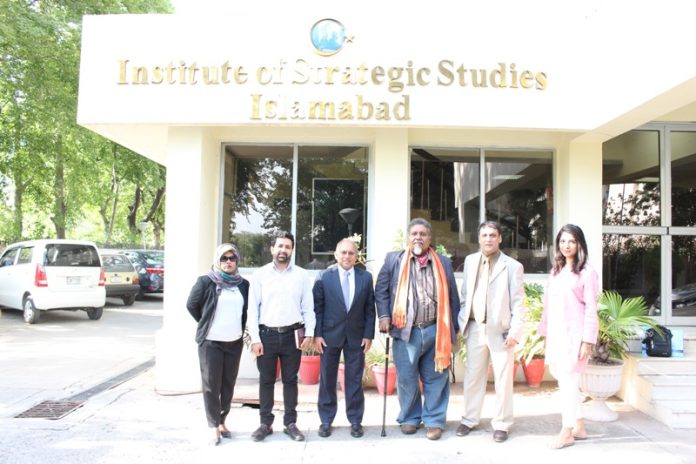Press Release
Public Talk
Indus Waters Treaty and Water Security
June 18, 2019
“India was allowed to use water without specifying the quantum of water for its use. Also, the surplus and shortages of water were to be shared mutually but no such provision has been given in the treaty. A large number of area was taken for granted presuming it would continue to receive uninterrupted supply of water from India. The pinching issue, however, is the design of water plants that India is constructing on the rivers flowing to Pakistan.” This was stated by Pakistan Commissioner for Indus Waters, Syed Mehr Ali Shah at a Public Talk on “Indus Waters Treaty and Water Security” organized by the Institute of Strategic Studies Islamabad (ISSI) on June 18, 2019.
The esteemed speaker gave an in-depth account of Indus water system; historical perspective of Indus Water Treaty; perceptions and realities on water wars between India and Pakistan; present condition and governance issues of water security in the country. By comparing different indicators, Syed Mehr Ali Shah elaborated that, over the years, the average water availability has not fluctuated much. Regarding settlements of differences and disputes, he highlighted many grey areas in the treaty, which worked to the advantage of New Delhi. It is stated in the treaty that India should notify Pakistan, six-month in advance, whereas Pakistan did not receive the construction details for the water reservoirs at the planning stage from India. However, adopting a balanced and objective view on the issue, the Commissioner turned down the exaggerated account of India creating water-related problems for Pakistan and called for a comprehensive plan for managing this issue on national policy front.
Earlier, in his welcome remarks, DG ISSI, Ambassador Aizaz Ahmad Chaudhry highlighted the importance of water which has been critical for human life from times immemorial. The Ambassador continued that Pakistan has been listed among water-stressed countries and is moving towards becoming a water scarce country. Alongside many internal factors, Ambassador Aizaz shed light on the external dimension of the issue i.e. trans-boundary water dispute. Appreciating Indus Waters Treaty as an instrument of avoiding water wars between India and Pakistan, DG ISSI raised a few points for further deliberations, including the most pressing question: how this situation can be dealt with, at a time, when India is aspiring to become a regional hegemon and not ready to incorporate Pakistan’s views into implementing the treaty?
Chairman Board of Governors ISSI, Ambassador Khalid Mahmood concluded the talk by stating that, other than the technical aspects, it is political will that obstructs the implementation of the treaty. Water security is becoming a pressing issue for both Pakistan and India, therefore, both should be at a table to resolve their differences.












